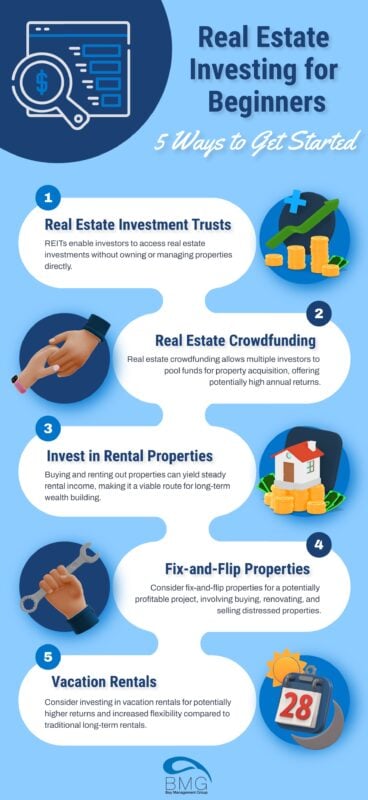Real estate investments have several benefits, whether you’re buying a rental property or pooling money together into a real estate investment trust (REIT). Either way, it’s important for beginners to know their options and choose one that aligns with their business goals. Today, we’ll go over real estate investing for beginners and five different strategies that can help you get started on your first investment.
Contents of This Article:
- Is Real Estate a Smart Investment Choice?
- 5 Ways to Get Started on Your First Investment
- Tips on Investing for Beginners
- Manage Your Investment With Ease
Is Real Estate a Smart Investment Choice?
Investing in real estate can be an excellent way to create and build wealth. However, you have to start somewhere and learn the ways of investing for beginners.

Generally, real estate can be a smart investment choice for many people, but it’s not risk-free. As such, prospective investors must do thorough research, understand their goals, and consider the risks before getting started.
That said, here are some of the main advantages of real estate, along with some considerations and risks to watch out for.
Advantages of Real Estate
- Potential for Appreciation- Historically, real estate has shown the potential to appreciate over time. While there are no guarantees, many investors have seen their investment properties increase in value, especially in up-and-coming areas with growing demand.
- Rental Income- If you invest in rental properties, you can generate a steady stream of passive income. This can provide financial stability and help offset the costs of owning the property, like mortgage payments, maintenance, and property taxes.
- Tax Benefits- Real estate investors can take advantage of several tax benefits. Some of the main benefits include deductions for mortgage interest, property taxes, and depreciation. Additionally, 1031 exchanges (in the US) allow investors to defer capital gains taxes while reinvesting in like-kind properties.
- Diversification- Real estate is a different asset class than stocks or bonds. As such, including real estate in your investment portfolio can provide diversification, potentially reducing overall risk. After all, the real estate market acts differently than the stock market, providing a slight hedge against market volatility.
- More Control- With real estate investments, you have more control compared to other investment types. For instance, you can make decisions about rental property management in Baltimore, renovations, and improvements, giving you some control over the potential return on your investment.
Considerations and Risks
- Capital-Intensive- Real estate typically requires a significant initial investment, including a down payment, closing costs, and potential renovation or improvement costs. In turn, this can limit accessibility for some investors.
- Market Fluctuations- The real estate market can be unpredictable, and property values can fluctuate due to several factors. For instance, you must consider economic conditions, local market trends, and other factors.
- Liquidity Issues- Real estate isn’t as liquid as other investments, like stocks. Selling a property can take some time, which is crucial to consider if you need quick access to your investment.
- Maintenance and Management- Owning real estate requires ongoing maintenance and management–especially rental properties. This can be time-consuming and may require additional expenses.
- Location Risk- The location of a property is a critical factor. Investing in a declining or unfavorable area can lead to poor returns or difficulty finding tenants. As such, researching and selecting the right location is crucial.
5 Ways to Get Started on Your First Investment
When you think of investing in real estate, you may think of buying rental properties and becoming a landlord. However, that’s not the only way you can invest. There are several investment strategies for beginners, some that don’t involve large amounts of capital. So, if you’re weighing the pros and cons of real estate investing, here are some strategies to consider.

- Real Estate Investment Trusts (REITs)
- Real Estate Crowdfunding
- Invest in Rental Properties
- Fix-and-Flip Properties
- Vacation Rentals
Real Estate Investment Trusts (REITs)
Real Estate Investment Trusts (REITs) are companies that own, operate, or finance income-producing real estate in various property sectors. They offer a way to invest in real estate without buying a property directly. So, instead of putting all your capital into one property, you can buy shares of a larger company that owns and manages real estate. That way, investors can reap the benefits of real estate investing without the burden of personally managing properties.
Real Estate Crowdfunding
Real estate crowdfunding is another alternative method of real estate investment that doesn’t involve directly buying properties. It shares similarities with REITs in that multiple investors can combine their funds to acquire properties. However, unlike REITs, crowdfunding investments are typically locked in for several years. In return, you receive annual returns that can be as high as 14% of your initial investment.
Invest in Rental Properties
Buying residential or commercial properties with the intention of renting them out to tenants can provide a steady stream of rental income. So, if you’re looking to build long-term wealth with a buy-and-hold investment, this may be an excellent route to take. However, it takes a significant amount of capital to buy a property, and you have to consider the cost of maintenance and property management.
Fix-and-Flip Properties
If you’re looking for a project to dive into, you may consider buying a fix-and-flip property. This strategy involves buying distressed or undervalued properties, renovating or improving them, and then selling them at a higher price for a profit. However, keep in mind that you’ll need to do research to ensure the property has potential and know how to successfully renovate properties. Additionally, seeking alternative financing, like a hard money loan, may be beneficial instead of traditional financing for short-term projects like fix-and-flip investments.
Vacation Rentals
If you’re interested in investing in rental properties but want more flexibility and potentially higher returns, you may consider buying vacation rentals. This practice involves renting out furnished properties, like houses, apartments, or condos, to travelers for short-term stays, giving them an alternative to hotels. Vacation rentals are a popular choice for investors because they can enjoy a level of flexibility that they typically wouldn’t with long-term rentals. For instance, they can choose the furniture, set competitive rates, and block out dates for personal use.
Tips on Investing for Beginners
There’s no perfect time to invest in real estate. However, it’s important to come up with a plan and do enough research before diving in. If you think it’s time to start your next investment, here are some tips on investing for beginners.
- Educate Yourself- The first and most important step in investing for beginners is education. After all, investing in real estate is hard if you don’t know much about the industry or current market. If you’re planning on investing time and money, it’s crucial to learn everything you need to know before investing.

- Maintain Good Credit- Your credit score significantly affects your financial health and investment opportunities. After all, a good credit score can help you access favorable interest rates for loans, which can be crucial for some investment strategies. So, to maintain or improve your credit score, pay bills on time, reduce outstanding debt, and avoid taking on excessive new debt.
- Save Your Money- Before you start investing, build a solid foundation by saving money. For instance, create an emergency fund to cover unexpected expenses and ensure you have enough saved up to meet your daily needs. Having a financial cushion can help you during market downturns and avoid tapping into investments prematurely.
- Consider a Partner- If you’re unsure about investing on your own or want to mitigate risk, consider partnering with a more experienced real estate investor. Working with someone who has a proven track record can provide valuable guidance and reduce the learning curve for beginners.
- Explore Different Options- There isn’t a one-size-fits-all strategy to investing in real estate. If you don’t want to own, manage, or maintain rental properties–you don’t have to! Instead, you may want to explore other options, like publicly traded REITs or real estate crowdfunding.
Manage Your Investment With Ease
Investing for beginners can be overwhelming. However, with the right amount of research and by looking at different strategies, it can become easier to make investment decisions. However, investing in real estate takes ongoing effort. For instance, if you’re investing in REITs or looking into crowdfunding, you’ll want to do your due diligence on finding the right platform or company to work with. On the other hand, if you buy a rental property or vacation rental, it’s crucial to take time to manage it effectively.
learn how BMG can help your investment succeed today!
One of the most efficient ways to manage rental properties is with a comprehensive management team, like Bay Property Management Group. Our team of industry professionals can help you market properties, find new tenants, conduct inspections, collect payments, and more. So, if you’re looking for help managing an investment property near Baltimore, Philadelphia, Northern Virginia, or Washington, DC, contact BMG today to learn how we can help.
